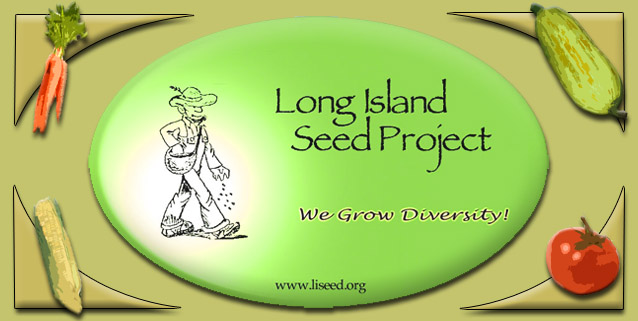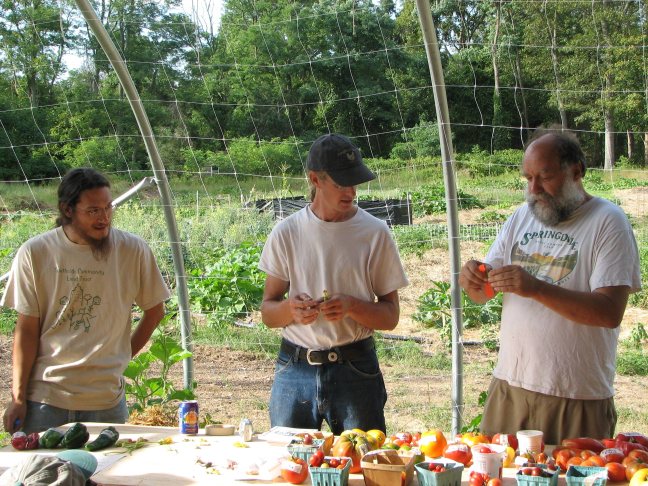It used to be that we referred to genetic manipulation just by simple methods such as cross pollination or selective seed gathering. Now its a whole different ball game in a world where they can splice genes under a microscope and cause them to create different chemicals. In fact as much as we know, we still don't know what happens exactly each time genes are "spliced" as you get a slightly different result. The idea of an exact method or perfect clone doesn't really exist, but it makes for good movies, or bad depending on what your view point is.
In the meantime, some people of wisdom decided that maybe its a good idea to carry on this method of saving naturally grown seeds. Just in case those others do not quite work out. We learned that with the monoculture that created the potato famine in Ireland. So I feel it is an important skill for many to know and understand seed saving and not leave it to just some organization or company, but rather a people skill. As important as knowing how to bandage a cut; we need to think about heirloom seeds as being just as important as the antique table in the dining room or the old clock.
I start my presentation with a NY Seed saving project on Long Island. They wish to educate more people about the need for saving seed. Just so you can get an idea of what its all about.
==========================================================
ABOUT THE LONG ISLAND SEED PROJECT
Long Island Seed Project's mission is to educate and inform the public about seed production issues and learn about how you can help in decentralizing seed production by creating your own garden and farm adapted varieties.
We are grateful to the Public Seed Initiative funded by USDA for it's leadership and inspiration and to the follow-up Organic Seed Partnership, locally administered by New York NOFA (Northeast Organic Farmers Association). In a world with increasing restrictions to access of germplasm because of what we believe are unfounded regulations both in the United States and abroad, plant patenting laws and "white lists", the OSP is a refreshing program that has breeders working with small farmers to produce better farm adapted varieties. Flanders Bay Farm which is host to the Long Island Seed Project is pleased to be a participant farm in that partnership.
We applaud the public and private sector plant breeders and seed savers all around the world who continue to allow access to their seeds so that sustainable varieties can continue to be grown and developed to benefit and serve the needs of the small farmer and gardener.
Long Island Seed Project was formed primarily as an outgrowth of the participation of our Flanders Bay Farm in the Organic Seed Partnership sponsored by NOFA-NY which promoted farm-based plant breeding to develop varieties bred especially suited to organic culture and ecological agriculture systems. NOFA-NY organized two breeding workshops (2006 and 2007) at Flanders Bay Farm which brought together vegetable breeders Michael Glos and George Moriarty from Cornell University, Jim Myers from Oregon State University and Brian Connelly from the University of Connecticut to help teach breeding techniques and inspire Long Island farmers.

Long Island Seed Project focuses on the issues involving seed breeding and the access to sustainable varieties that growers can maintain by traditional seed saving. The project helps to distribute potentially useful "unfinished" vegetable varieties and "gene pools" from the Project's Seed Bank to farmer breeders and hobby breeders sometimes referred to as "back-yard breeders".
Long Island Seed assists backyard breeders in developing their own regionally adapted varieties by sharing seed saving experiences and providing information through the internet site: www.liseed.org.
Through this web site, the distribution of seeds of potentially valuable genetic material to it's members and the local projects we are involved in, it is our hope that we can help make your "growing" experience more rewarding, enjoyable and sustainable.

| Last updated: Dec. 2008 |
|---|

|
Welcome to the Long Island Seed Project!
Long Island Seed Project is a volunteer organization working to produce farm-bred seed ecologically on Eastern Long Island as part of a network of breeders, farmers and gardeners. Our focus is on seeds of interest to the organic gardener, small farmer, seed saver and "backyard breeder".
Through this web site and the various local projects that we participate in, it is our hope that we can keep you informed and help to make your "growing" experience more rewarding, enjoyable and sustainable. Our web site; we hope, will provide you with seeds as well as useful information on vegetable breeding and seed saving and allow us to share with you some of the on-going projects that we are involved in. Although the focus of our work is developing and propagating suitable varieties for Long Island, we invite others to make inquiries.
Ken Ettlinger
Long Island Seed Project
Flanders' Bay Farm, NY




















No comments:
Post a Comment